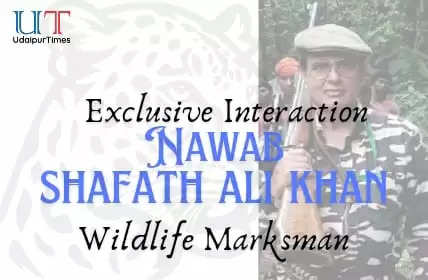Shafat Ali Khan: God Has Sent Me Into This World On A Mission
Meet this sharp shooter from Hyderabad who has been in confrontations with deadly animals since the young age of 19
Well-known sharp shooter of India, Nawab Shafat Ali Khan is in town having been called in by the Forest Department to track down the man-eater leopard that has created panic in Gogunda district of Udaipur. Since the past three weeks, nine people have been killed in villages leading to fear among residents who have accused the administration of inaction. Soon after the Chief Wildlife Warden of Rajasthan issued an order, under Section 11B of the Wildlife Protection Act of 1972, seeking the capture, tranquillising or killing of the man-eater (in this sequence). Shafat Ali Khan has been called in to take over this mission.
UdaipurTimes caught up with this fearless gentleman from Hyderabad and got an insightful interview from him.
UT: Can you tell us how your journey began?
SAK: Interesting and long story. My grandfather was an advisor to the British administration. Those days there were no tranquillisers, etc., so man-eaters and rogue elephants were generally killed. My grandfather, being a hunter, was given this task and he performed this for over 40 years.
So, during my growing-up years, our breakfast table conversation would veer around this topic. My grandfather would discuss his adventures and tell us anecdotes about how a particular rogue elephant was tracked down or about a particular man-eater tiger that had killed 50 people. And how these animals were taken care of.
So I grew up listening to these stories and it began to create a sense of curiosity and interest in me. We were from a noble family from Hyderabad. God had given me everything. But my nature was such that I could not bear to see the sufferings of people, whether needy or ill. So when I used to go out with my grandfather on missions into the forests and see bodies of people killed by wild animals or half-eaten bodies of human beings, I used to feel very disturbed. I started to then believe that God had sent me into the world on a mission….to alleviate the sufferings of those who are helpless and vulnerable.
And so my journey began and has continued till today.
I was not even 20 years old when I got my gun licence. This was after I was recruited to kill a rogue elephant that had killed 12 people in Mysore. I tracked the elephant, identified it and killed it. Getting a gun licence even before I turned 20 might have been some kind of a world record. It became an international news
Thereafter, I was getting called to various places, including Assam and Meghalaya, to take care of man-eaters or rogue elephants. This is how it became my profession.
UT: You began going out into the forests facing deadly animals at a very young age. And now, too, you go onto this extremely bold expeditions. How does your family take to this?
SAK: My wife is always tense whenever I am out on my missions. My son Asghar takes care of our resorts but he accompanies me whenever any operation is at the peak. Yes, my family does feel the tension but I believe that till it is not your time to leave this world, you will not go. And when the time comes, nothing or nobody can avert it.
I had been fond of shooting since a child. At the age of 12 I won a gold medal at the national games. You see, in my childhood our home used to have horses and elephants. So I grew up being surrounded by and taking care of them. Therefore, I lost all fear of animals.
So life became such that be it a man-eater tiger or a leopard, I fearlessly went on these missions and also handled 72-73 half-eaten bodies with my own hands. So such things have made me tough on the battlefield. Whenever I am called, my goal on these missions is only one - to solve the problems of the local people. And bring happiness back into the life of those who have been affected. My work is a free-of-cost social service.
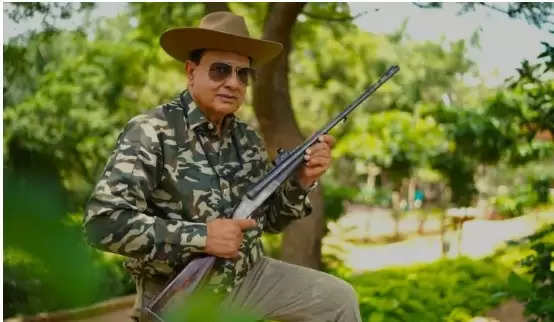
UT: When you go on a mission and kill the animal, what is the reaction of the public? Do they appreciate it?
SAK: Look, I face two types of people here. On the one hand there are the wildlife and forest lovers who are upset with me and on the other side, there are the forest dwellers, the villagers, adivasis, the poor people, who shower love on me. You cannot imagine the poor in our country. I want to stress on your readers the unimaginable contrast in our country. The poor works all day and gets to light his stove only at night. If a man-eater kills that man, 90% of his family is destroyed.
Our critics may have their point of view but when I see the tears of happiness in the poor people’s eyes after we have caged an animal or tranquillised it, it nullifies the criticism we face and so…we continue with our mission.
UT: You have conducted many operations. Would you like to share one which was very challenging for you? One that is very memorable?
SAK: Every operation is always very dangerous. See for example, your case here in Udaipur. A leopard has killed several people. The police, Army, forest department and administrative forces have been carrying out operations but without success. Only when everything fails then we are called. Which means the risk has increased. Then using our experience, our guns, our tranquillising expertise we carry out the operation. Hence, for us each operation is very risky. I have taken many risks in my life.
UT: Were you attacked by any animal during your operations?
SAK: You see, when we tranquillise an animal the effect is not immediate. After being injected with the medicines we give for this - Getamine and Xylazine - it takes 10-15 minutes for the animal to become unconscious. During that period, the animal becomes slow but is not completely unconscious. Once it so happened that I got close to a tiger to tie up the neck but it was still not fully tranquillised and it hit me with its paw . One buffalo, who we were tackling, attacked me with its horn injuring my leg. I was laid up in the hospital for a month and a half. Then once in Karnataka, I was bitten by a snake while tracking a leopard. So the risks have been many.
UT: Seeing the risks, has your family ever told you that now you should stop? That we will not let you continue this risky work?
SAK: Yes, my wife, pressurises me to leave it, retire. But I am very passionate about this work. I believe God has sent me into this world to do this work. I am able to do what 140 crore people cannot do. Today we have been called here to Udaipur. Here, you have many veterinary doctors, experts… everything is available here. But yet, they are not able to do it. So we are called in because we have that edge, that experience. I am at the stage in my life where I give 100% to any operation.
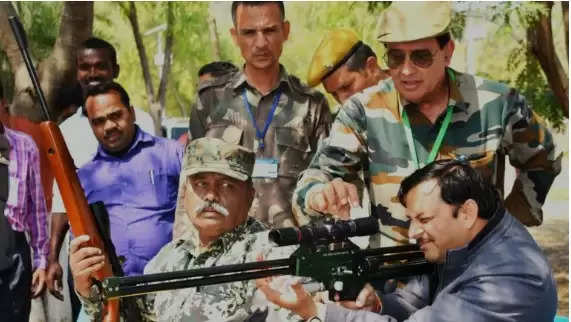
UT: When there is danger lurking, people tend to move in the opposite direction, away from it. But you move forward and in the direction of the danger. How do you manage to do it?
SAK: See, I don’t drink alcohol but such operations - the danger, the risk - all these give me a high, they intoxicate me. The more the danger, the more adrenaline my blood pumps.
I would like to share this particular incident in central India where a tiger attacked a pregnant young women and dragged her body leaving behind a trail of blood. My shoes and trousers were covered with blood. We followed the animal but halfway through, the officials accompanying me got cold feet and I found I was alone on the track. After a point, the tigress left the body and disappeared. I hid behind a fallen tree and waited. When it became dark, the tigress returned to the spot. And that is when I killed it.
Human psychology is such that even the sound of a cracker startles us. But for me, I work in dangerous circumstances and achieve success. That keeps me going.
UT: Over the years and after conducting so many operations, have you received any appreciation from governments or administrations?
SAK: A lot. I have more than 100 appreciation letters from UP and Maharashtra. Recently, in Bihar we carried out an operation on ‘blue bulls’ or nilgais, I was given Lifetime Achievement Award by the Collector there. The nilgais had spread destruction in the whole Vaishali district and farmers were dying of hunger. We helped save the situation.
UT: We came to know that recently you were recruited to get rid of man-eater wolves that had created much havoc in UP?
SAK: Yes, the wolves had become vey violent. They killed 12-13 children and attacked around 40 people. I shared my experience with the people there, advising them on how to set up cages, etc. We managed to catch five of them. Now for the last 10 days no untoward incident has been reported from there.
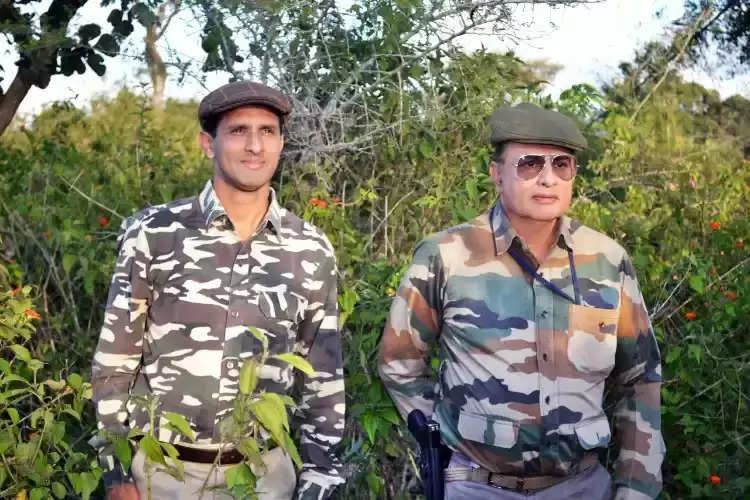
UT: Is your son also interested in this work. Does he accompany you on your missions?
SAK: Yes, Asghar is interested in this work and he also has many experiences while working with me.
Look, my reading of the current situation is that the way wildlife is being managed these days, going forward this problem will only rise. Wildlife is increasing, human population also increasing. Forests are being cut down. Animals have nothing to eat.
Take for example, the Udaipur leopard case. Four leopards have been caught and the man-eater is still at large. We visited the area and spent the night from 10:00 pm to 4:00 am in a five-km area. We did not see a single rabbit, wild boar, fox or even a mouse. So what will the leopard eat? No one has the right to keep wildlife and not provide it food. No religion… no one, according to me, has the right to keep animals and not give it food. I have four dogs. I have budgeted for their daily food. But the day I cannot feed them I shall let them go.
A tiger or a leopard hunts once a week. Which means it hunts 52 times a year. So take five leopards and multiply by 50. Which means that to sustain them for a year, we need 250 deers or pigs, etc. Where are these? These animals are not there. The food chain is finished. The prey base is completely destroyed.
Owing to this, the animal’s psychology has changed and that is why it has become a man eater. So we need to focus on providing them food artificially…tie up goats or dogs so that they can eat and live a normal life.
See, according to me, in a country like India which has a population of 140 crore no animal can live outside the forest. Whatever the forest is - core forest, buffer forest reserve forest - we have to keep the wildlife within this boundary and not allow it outside. Sooner or later, the government of India will have to fence in the forests so that people don’t go inside, don’t cut down trees and animals don’t come outside. So that the cattle in villages don’t go into the reserve forest and wild animals don’t come out. Till this is not done, the man-animal conflict will not get resolved. In fact, it is going to increase day by day.
In 2005 in Maharashtra there were 100 tigers. Today in that State there are 400 tigers. Forest is being cut down, population of humans is increasing. So what will happen? In 2023, people poisoned or electrocuted around 100 tigers.
Section 11B of the Wildlife Protection Act of 1972 gives statutory power to the Chief Wildlife Warden to take action. If he does not use those powers then forest dwellers will kill all leopards by poisoning them. It is natural that you cannot reason with someone whose father is dying or his son has been killed by an animal.
Let us go one step further. Take Article 21 of our Constitution, for instance. The Right to Life. My life without due process of law. No one can take it. It is my fundamental right. Supreme Court has gone one step ahead and said Right to Life is to live with dignity, with respect, with goodness, while earning lawfully.
Now, think of the recent incidents in Gogunda. So many people lost their lives. What was their mistake? Think with a cool mind… on the one hand is law Section11B which says that if any animal becomes dangerous then the State’s Chief Wildlife Warden by order in writing can cause such an animal to be hunted. Very clear rule.
On the other hand is the Constitution, which says that my life is guaranteed, that no one can take it. Court can hang me, my appeal can be dismissed in the Supreme Court, the President of India can finish it. And then hang me. That is due process of law.
Think of that poor woman who is working in the fields. The leopard leaves the forest, goes into her field and kills her. And the whole administration is sleeping. It defies logic. Can such a thing happen in the US? Can it happen in any advanced nation… that a wild animal kills so many people and the administration is quiet, there is no shoot order? This is because there is someone out there…who is a forest lover and trying to frighten off everyone. Leading to cases being filed in Supreme Court.
So if we do not implement the law out of fear of them then that day is not far when the people will decide to finish wildlife and no power will be able to stop them. No administration, no Army, no forest department officials… nobody will be able to crush people’s power. And that day has come.
You go to the villages where these incidents have occurred. See the atmosphere and sentiments there. If we go talk to those villagers about conservation, about planting a sapling, about saving a wild animal…you will not be given even a glass of water.
These are our own people, our brothers and sisters, our forest lovers, our tribal people… we have made them enemies of our forest. And these are the very people who have for centuries and generations been saving the forests. They are the true conservationists.
UT: Don’t you think that we human beings are intruding into the forests? Houses are being made in the middle of the jungle and people living there?
SAK: Look, what is the definition of a forest. The sanctuary, the notified forest is forest. If due to the rains, grass and plants grow outside my house that does not make it a forest area. It is not a forest. It is a private piece of land. Where these people are living by farming. Why did the leopard come there? What was the forest department doing? What was its surveillance team doing? How did the leopard get there? A dangerous animal like a leopard goes near schools, children areas, clinics… how?
This is not Australia nor is it Africa. I had gone to Tanzania to learn tranquillising. When we would travel from Dar-us-Salaam to Tabora, which is around 800 miles or 1200 kms, we would see only two villages. We had been driving for six hours but did not see a single person. Not like in India where there is a house and cattle to be seen every 100 meters. Think about the killing of the temple priest (in Gogunda). The poor man was sleeping in a temple. What was his fault?
We have to think that the “forest” is what is called “notified forest”. That is the forest. Four trees around my house does not classify the area as forest.
According to me, no wild animal can be allowed beyond the boundary of a fortified forest. If it comes out then people are going to die. If people die then wild animals will die. There will be a chain reaction. It has already happened. National Tiger Conservation Authority is not able to take any action. More than 100 of our tigers and leopards died in 2023 due to poisoning or electrocution. 70-80 elephants have died. 800 people have died due to elephants. 100 people have died in Maharashtra due to tiger attacks. So where will this conflict end up stopping?
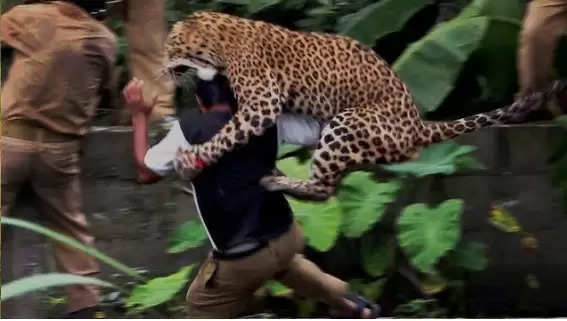
UT: Have you trained others in what you do?
SAK: There are a lot of youngsters who admire my work and work alongside. Here in Udaipur we are working with local people - Narpat Singh, Pramukhji. This is the first time I have come to Udaipur and have found local support here. Then there are Farhan, Kamran and Danish. They are with me and help me in every way.
Once I was in Jharkand in the most interior parts to conduct an elephant operation. There tribals from far off places would come to where I was and be with me. They would cook for me, stay in my camp and help me. They had realised they did not have a godfather in the forest department who would come and stay with them to help them. I stay with them. I eat with them. So there is bonding between us. My life is an open book. I have been a resource person for nine States. There are hundreds of veterinary doctors whom I have taught tranquillising, how to use a tranquillising gun. We have an NGO Wildlife Tranquil Force through whom we provide training in tranquillising and shooting.
UT: We believe your grandfather was your inspiration?
SAK: Yes, he was. I regret the inaction today because even during the British times in India, they knew they had to immediately control man-animal conflict by calling in the experts. The British administration would send in Jim Corbett to go handle the situation. He was not a vet, nor a wildlife lover nor a forest officer. He would walk around the jungle on foot and kill man-eaters. Today India’s best National Park has been named after a hunter - Jim Corbett National Park. So we must acknowledge the importance of immediate action.
Today I have weapons, tranquillising guns, equipment, vehicles, experience which the administration does not have. Talking of the woman who was killed 2-3 days ago. We went to the spot and put a readymade portable machaan up within 5 minutes. Without needing to cut down any tree.
We were continuously getting alarm calls of the monkey. It was a golden opportunity for us to catch the leopard, tranquillise it or shoot it.
Why the forest department does not have such a machaan? Till we don’t have our people sitting on them to look out for the leopard, how can we think of saving people from such attacks?
We should not allow the leopard to become alert and stay ahead. Every human failure will become a new lesson for that predator. And the more games we play with it, the more alert it will become.
To join us on Facebook Click Here and Subscribe to UdaipurTimes Broadcast channels on GoogleNews | Telegram | Signal



